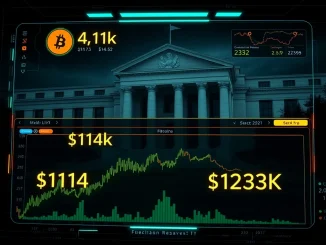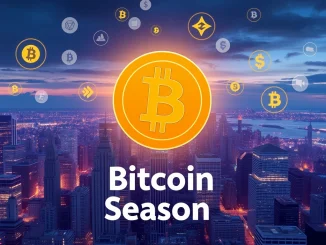
Reports suggesting that South Korea was on the verge of introducing significant changes to its digital asset landscape, including spot Bitcoin ETFs and comprehensive stablecoin rules, have been abruptly halted. This unexpected turn comes directly from the nation’s financial watchdog, casting a shadow of uncertainty over the immediate future of South Korea crypto regulation.
South Korea Crypto Regulation Reports Denied
Initial reports, citing a policy briefing allegedly presented by the Financial Services Commission (FSC) to the National Policy Planning Committee, indicated that measures for spot Bitcoin ETFs and a stablecoin framework were part of the new administration’s agenda, potentially set for implementation within the year. This news generated considerable optimism within the local and international crypto communities, anticipating a clearer and potentially more favorable regulatory environment in South Korea.
However, the FSC has moved swiftly to counter these reports. According to The Korea Economic Daily, the regulator clarified that while discussions and considerations are ongoing, no official decisions have been made regarding these specific policy initiatives. This denial suggests that the reported timeline and specific plans were either premature or inaccurate representations of the FSC’s current position.
What About Bitcoin ETF Korea?
A key point of contention in the initial reports was the potential approval of spot Bitcoin ETFs in South Korea. The global financial landscape has seen increasing interest and adoption of such products, particularly following the approval of spot Bitcoin ETFs in the United States earlier this year. Many market participants hoped South Korea would follow suit, providing investors with regulated avenues for exposure to Bitcoin directly through traditional brokerage accounts.
The FSC’s denial specifically addresses this point, stating that plans for a Bitcoin ETF Korea are not officially decided. This clarification is significant as it pushes back against the narrative that regulatory approval for these products was imminent. It indicates that the FSC is still in the evaluation phase, and there is no concrete timeline for when, or if, such products might be permitted in the country.
The Status of Stablecoin Rules South Korea
Alongside Bitcoin ETFs, the reports also mentioned the establishment of a regulatory framework for stablecoins. Stablecoins, digital currencies pegged to stable assets like fiat money, have become a critical component of the crypto market, used for trading, lending, and payments. Regulatory bodies worldwide are grappling with how to oversee these assets to ensure financial stability, protect consumers, and prevent illicit activities.
The FSC’s statement also denied immediate plans for implementing specific stablecoin rules South Korea. While South Korean authorities have previously expressed intentions to regulate stablecoins, this denial suggests that a concrete framework is not yet finalized or scheduled for release within the year, as the initial reports implied. The lack of a clear framework adds to the regulatory uncertainty surrounding these assets in the South Korean market.
Understanding the FSC Crypto Policy Stance
The Financial Services Commission (FSC) is the primary financial regulator in South Korea, responsible for overseeing banks, securities firms, and the broader financial market, including aspects of digital assets. Their recent statement provides insight into the current state of FSC crypto policy development.
The denial emphasizes that policy formation is a deliberate process. While the new administration may have a broad agenda concerning digital assets, specific regulatory measures like allowing spot Bitcoin ETFs or finalizing stablecoin rules require thorough review, consultation, and internal consensus before becoming official policy. The FSC’s pushback highlights that the reported measures were likely proposals or internal discussions rather than confirmed decisions ready for implementation.
What This Korea Crypto Update Means
This latest Korea crypto update from the FSC introduces a degree of caution for market participants who were anticipating swift regulatory progress. The denial means:
- Delayed Bitcoin ETF Hopes: Spot Bitcoin ETFs are not on the immediate horizon in South Korea, contrary to previous reports.
- Ongoing Stablecoin Uncertainty: A specific regulatory framework for stablecoins is not finalized or expected imminently.
- Policy Process: Regulatory decisions are still under evaluation by the FSC, and there is no clear timeline for major policy shifts.
- Need for Official Announcements: Market participants should rely only on official statements from the FSC for accurate information regarding regulatory changes.
The situation underscores the cautious approach regulators are taking globally when integrating digital assets into traditional financial systems. While South Korea remains a significant market for cryptocurrency trading and innovation, this denial signals that major regulatory milestones, such as allowing spot Bitcoin ETFs or finalizing comprehensive stablecoin rules South Korea, will take more time to materialize than some reports suggested.
Conclusion
The South Korean Financial Services Commission has firmly denied recent reports suggesting immediate plans to introduce spot Bitcoin ETFs and establish stablecoin regulations within the year. This Korea crypto update clarifies that while these topics are likely under consideration as part of the new administration’s digital asset agenda, no official decisions or timelines have been set. The FSC’s statement serves as a reminder that regulatory processes are complex and often move slower than market expectations. For investors and businesses in the South Korean crypto space, this means maintaining patience and waiting for official announcements from the FSC regarding the future of South Korea crypto regulation.



